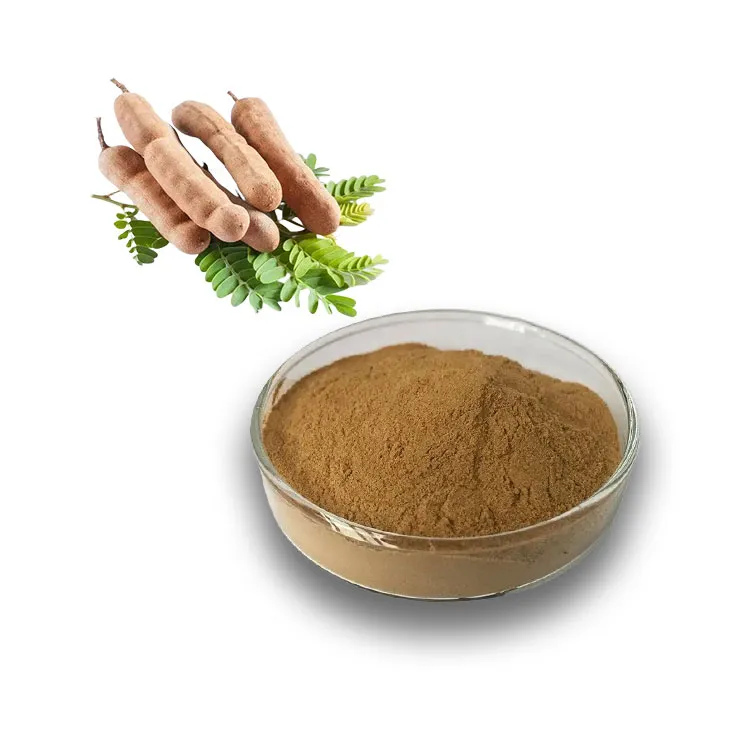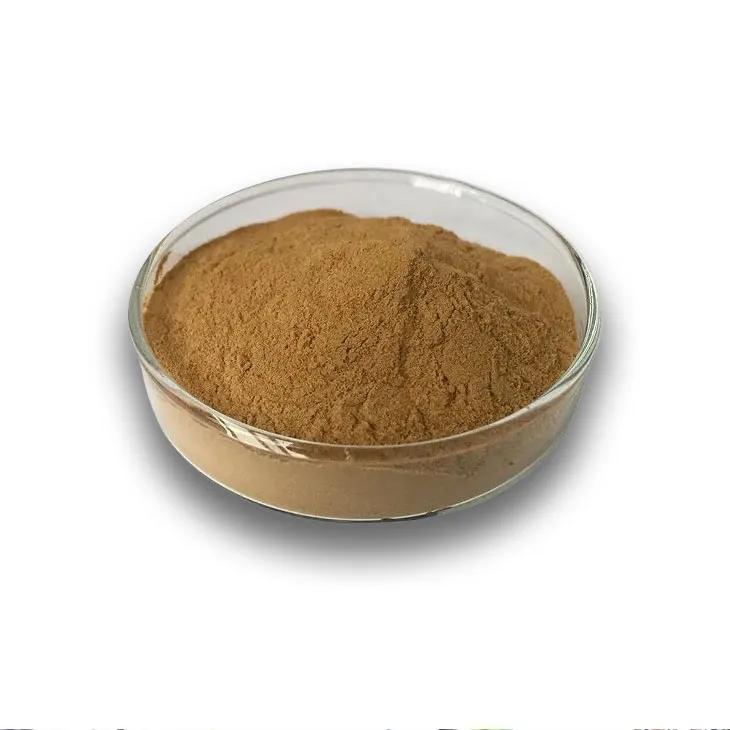- 0086-571-85302990
- sales@greenskybio.com
Tamarind extract powder: Is the extract effective for weight loss?
2024-11-11

Introduction
In the quest for effective weight loss solutions, many natural substances have come under the spotlight. One such substance is Tamarind extract powder. Tamarind, a fruit native to Africa but widely used in various cuisines around the world, has been touted for its potential health benefits, including weight loss. But how much truth is there to these claims? In this in - depth article, we will explore different aspects of Tamarind extract powder to determine its efficacy in weight loss.

What is Tamarind extract powder?
Tamarind extract powder is derived from the tamarind fruit. The fruit itself has a tangy and sweet flavor and is rich in various nutrients. The extraction process concentrates these components, making the powder a potent form of the fruit's essence. It contains vitamins such as vitamin C, minerals like potassium, and other bioactive compounds.

Tamarind Extract Powder and Metabolism
1. Thermogenesis
One way in which tamarind extract powder might contribute to weight loss is through thermogenesis. Thermogenesis is the process by which the body generates heat, and this can increase the body's basal metabolic rate (BMR). Some studies suggest that certain compounds in tamarind may stimulate thermogenesis. For example, flavonoids present in tamarind could potentially increase the activity of brown adipose tissue (BAT). BAT is responsible for burning calories to produce heat, and an increase in its activity could lead to more calories being burned at rest. However, more research is needed to firmly establish this link and determine the magnitude of the effect on overall metabolism.
2. Digestive Enzyme Activity
Tamarind extract powder may also play a role in enhancing digestive enzyme activity. Enzymes are crucial for the breakdown of food into smaller molecules that can be absorbed by the body. If digestion is more efficient, it could potentially lead to better nutrient absorption and a more balanced metabolism. Tamarind contains enzymes such as amylase, which helps in the breakdown of carbohydrates. By promoting the activity of these enzymes, it may ensure that carbohydrates are metabolized properly, reducing the likelihood of excess carbohydrate storage as fat. But again, the evidence in this regard is not conclusive, and further studies are required to fully understand its impact on digestive enzyme activity and metabolism.

Tamarind Extract Powder and Appetite Regulation
1. Fiber Content
Tamarind extract powder is a good source of dietary fiber. Fiber has a significant impact on appetite regulation. When consumed, fiber absorbs water in the digestive tract, forming a gel - like substance. This substance adds bulk to the stool and also slows down the emptying of the stomach. As a result, it gives a feeling of fullness or satiety, which can reduce overall food intake. High - fiber foods like tamarind extract powder can help control cravings and prevent overeating.
2. Hormonal Influence
There is also some evidence to suggest that tamarind may influence hormones related to appetite. For instance, it may affect the levels of ghrelin and leptin. Ghrelin is known as the "hunger hormone" as its levels increase before meals, signaling the body to eat. Leptin, on the other hand, is the "satiety hormone" which tells the body when it has had enough to eat. Some preliminary studies indicate that tamarind extract may help regulate these hormones in a way that promotes a feeling of fullness and reduces appetite. However, this area of research is still in its early stages, and more comprehensive studies are needed to confirm these hormonal effects.

Tamarind Extract Powder and Fat Absorption
1. Inhibiting Lipase Activity
Lipase is an enzyme responsible for breaking down fats in the digestive tract so that they can be absorbed by the body. Some studies have proposed that certain compounds in tamarind extract powder may inhibit lipase activity. If lipase activity is inhibited, less fat will be broken down and absorbed, which could potentially lead to a reduction in overall body fat. However, the effectiveness of this inhibition in a real - life scenario and its long - term impact on weight loss are yet to be fully determined. Moreover, interfering with normal fat absorption processes may have other implications for the body's nutrient uptake and overall health, which need to be carefully considered.
2. Binding to Fat Molecules
Another possible mechanism by which tamarind extract powder could affect fat absorption is by binding directly to fat molecules. This binding could prevent the fats from being absorbed through the intestinal walls. While this sounds promising in theory, there is currently limited evidence to support this specific mechanism. More research is needed to understand if and how tamarind extract powder can effectively bind to fat molecules and reduce fat absorption.
Limitations and Considerations
1. Lack of Comprehensive Studies
One of the major limitations in determining the effectiveness of tamarind extract powder for weight loss is the lack of comprehensive, long - term studies. Most of the existing research is in the form of small - scale studies or preliminary investigations. These studies may not be able to fully capture the complex interactions that occur in the human body when it comes to weight loss. To truly understand the potential of tamarind extract powder, large - scale, well - designed clinical trials are essential.
2. Individual Variations
Another important consideration is the individual variability in response to tamarind extract powder. Different people may have different metabolic rates, gut microbiota compositions, and genetic factors that can influence how their bodies respond to the powder. What may work for one person in terms of weight loss may not work for another. For example, some individuals may have a more efficient digestive system that can quickly break down and absorb the components of tamarind extract powder, reducing its potential impact on weight loss.
3. Quality and Purity of the Product
The quality and purity of tamarind extract powder products on the market can vary widely. Some products may contain additives or contaminants that could affect their safety and efficacy. It is crucial to choose high - quality, pure tamarind extract powder from a reliable source. Low - quality products may not contain the active compounds in sufficient quantities to have any real impact on weight loss.
Conclusion
Tamarind extract powder shows some potential in the areas of metabolism, appetite regulation, and fat absorption that could contribute to weight loss. However, the current evidence is not strong enough to definitively state that it is an effective weight loss tool. More research, especially large - scale clinical trials, is needed to fully understand its mechanisms of action and its true effectiveness in promoting weight loss. In the meantime, those interested in using tamarind extract powder for weight loss should also consider other aspects such as a balanced diet, regular exercise, and overall healthy lifestyle choices.
FAQ:
Question 1: How does tamarind extract powder affect metabolism for weight loss?
Tamarind extract powder may contain certain compounds that could potentially influence metabolism. Some studies suggest it might have a mild effect on increasing the metabolic rate. However, the evidence is not conclusive. It could potentially interact with the body's energy - processing mechanisms, but more research is needed to fully understand this aspect. For example, it may contain bioactive substances that could stimulate the breakdown of fats or enhance the function of mitochondria, which are the powerhouses of cells and play a role in metabolism. But at present, we cannot say with certainty that it has a significant impact on metabolism for weight loss.
Question 2: Can tamarind extract powder effectively suppress appetite?
There is some indication that tamarind extract powder might have an effect on appetite regulation. It could potentially act on the body's hormonal systems related to hunger and satiety. For instance, it might influence the levels of hormones like ghrelin (the hunger hormone) and leptin (the satiety hormone). However, the degree to which it can effectively suppress appetite varies from person to person. Some people may experience a noticeable reduction in appetite, while for others, the effect may be minimal. Overall, while it shows some promise in this regard, it is not a guaranteed appetite suppressant for weight loss.
Question 3: Are there any side effects of using tamarind extract powder for weight loss?
Although tamarind is generally considered safe when consumed in normal amounts as part of the diet, when used in extract powder form for weight loss, there could be potential side effects. Some individuals may experience digestive issues such as stomach upset, diarrhea, or abdominal cramps. This could be due to the concentrated nature of the extract. Also, in rare cases, allergic reactions may occur, especially in those who are allergic to tamarind or related plants. Moreover, if it is consumed in excessive amounts in the hope of rapid weight loss, it may disrupt the body's normal physiological balance.
Question 4: How should tamarind extract powder be consumed for potential weight loss?
If one decides to try using tamarind extract powder for potential weight loss, it is important to follow proper guidelines. It should be consumed in moderation. Typically, it can be added to water or other beverages and consumed a few times a day. However, it is not advisable to rely solely on it for weight loss. It should be part of a comprehensive weight - loss plan that includes a balanced diet and regular exercise. Also, it is crucial to consult a healthcare provider before starting any new supplement regimen, especially if there are underlying health conditions or if one is taking other medications.
Question 5: Is there enough scientific evidence to support tamarind extract powder as a weight - loss aid?
Currently, there is not sufficient scientific evidence to firmly establish tamarind extract powder as an effective weight - loss aid. While there are some preliminary studies and anecdotal reports suggesting its potential benefits for weight loss in terms of metabolism and appetite regulation, more rigorous scientific research is required. Most of the existing evidence is not comprehensive enough to draw definite conclusions. Many of the studies have been small - scale or in vitro, and there is a lack of large - scale, long - term human trials. So, while it may show some promise, it cannot be recommended as a reliable weight - loss solution at present.
Related literature
- The Potential of Tamarind (Tamarindus indica L.) in Health and Nutrition"
- "Metabolic Effects of Botanical Extracts: A Review with Focus on Tamarind"
- "Appetite Regulation and Natural Supplements: Is Tamarind Extract a Player?"
- ▶ Hesperidin
- ▶ citrus bioflavonoids
- ▶ plant extract
- ▶ lycopene
- ▶ Diosmin
- ▶ Grape seed extract
- ▶ Sea buckthorn Juice Powder
- ▶ Beetroot powder
- ▶ Hops Extract
- ▶ Artichoke Extract
- ▶ Reishi mushroom extract
- ▶ Astaxanthin
- ▶ Green Tea Extract
- ▶ Curcumin Extract
- ▶ Horse Chestnut Extract
- ▶ Other Problems
- ▶ Boswellia Serrata Extract
- ▶ Resveratrol Extract
- ▶ Marigold Extract
- ▶ Grape Leaf Extract
- ▶ blog3
-
High purity olive leaf extract
2024-11-11
-
Lavender oil extraction method
2024-11-11
-
100% organic virgin sea buckthorn fruit oil
2024-11-11
-
Lotus leaf extract powder factory in China
2024-11-11
-
China aged garlic extract supplier
2024-11-11
-
Deer antler extract powder manufacturer
2024-11-11
-
Saw palmetto extract vs whole herb
2024-11-11
-
Cranberry Extract
2024-11-11
-
Citrus bioflavonoids
2024-11-11
-
Passionflower Extract
2024-11-11
-
Hawthorn Extract
2024-11-11
-
Lycopene
2024-11-11
-
Lily extract
2024-11-11
-
Coconut Water Powder
2024-11-11
-
Horse Chestnut Extract
2024-11-11
-
Artichoke Extract
2024-11-11
-
Sea buckthorn Juice Powder
2024-11-11





















